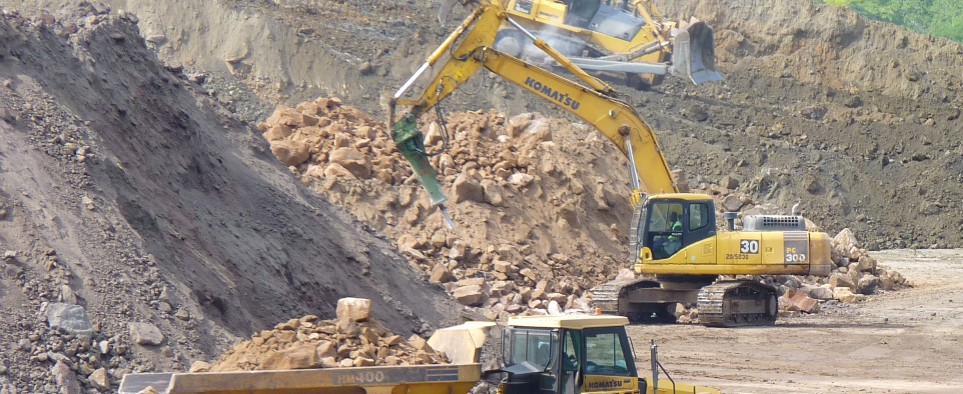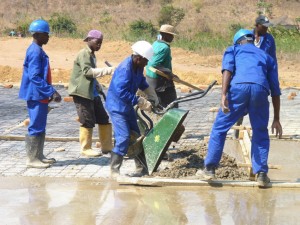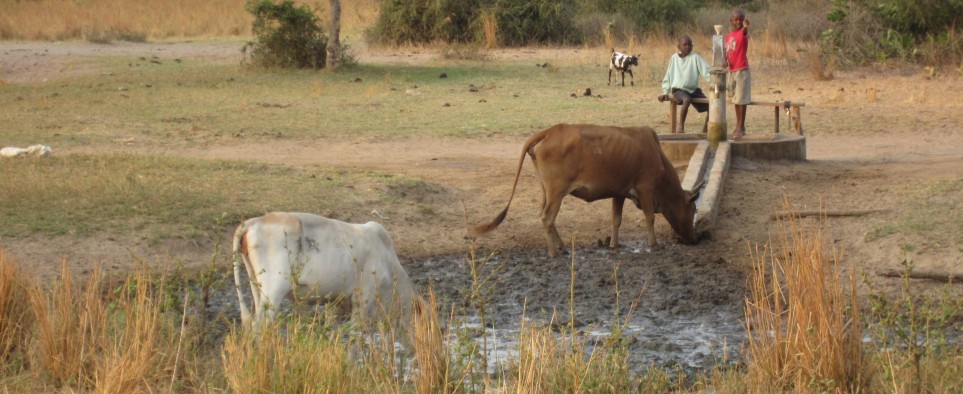[A version of this post ran on CSR Wire on March 20, 2015, available here.]
Between the global food crisis of 2008, the unanimous UN endorsement of Guiding Principles on Business and Human Rights and the undeniable influence that climate change is having on agricultural areas, a wide array of longstanding corporate social responsibility (CSR) initiatives now share space under a single umbrella: corporate human rights due diligence. As these initiatives converge around global business, it is becoming clear that piecemeal efforts to tackle supply chain challenges are not sufficient to make supply chains rights-respectful and truly environmentally sound. There are still many lessons to be learned in the corporate sector.
Water protests are about more than just quantity
Challenges in managing water risks in corporate supply chains shed light on the ways that corporate risks overlap and interact. Activists’ and communities’ growing use of human rights language to protest corporate water impacts is an embodiment of this new reality. Right to Water protests do not simply ask companies to account for their water usage – they demand that companies consider holistically the livelihoods, insecurities and welfare of the people surrounding their operations. In the agricultural supply chain, challenges are manifold. In some cases, small-scale farmers are demanding attention from large-scale agricultural operations that displace them. In others, cash crops are supplanting subsistence crops. This may appear to benefit food security in the short term, but if replacement crops are more water-intensive or less resistant to climate change, it may actually be detrimental to human welfare in the long term. When market prices tank or harvests are destroyed, smallholder cash crop growers stand to lose everything. Such events have been followed by anti-corporate protests around the globe. Beyond the agricultural supply chain, companies face additional, non-technical challenges. For example, Coca-Cola has experienced a clear call for holistic engagement on water issues with its operations in India. The company has operated a bottling plant in Varanasi since 2001 that has faced consistent water protests although hydrology experts have shown that Coke’s water use is not causing or materially contributing to the area’s falling water table. A documentary film in 2012 alleged that Nestlé was draining an aquifer used by farmers in Lahore, Pakistan. The company asserts that agriculture, not its plant, is lowering the aquifer, although evidence is lacking. The technical information—the data— would be important, but that misses the point of the protests: water security, including perceived water security, is changing.
Water Risks Aren’t Cut and Dry
Water crises are growing increasingly frequent and ubiquitous. A glance at a water scarcity map can no longer predict the site of the next catastrophe. Last month alone, two of the world’s wettest tropical countries – Brazil and Thailand – announced water crises. Unequal water distribution and pollution in Mexico has caused extreme water stress in key agricultural regions, and protesters have already halted construction of a dam that farmers feared would affect their water access. Pakistan has seen its water availability drop five-fold in 70 years, and now its joint water and energy crisis is creating double resource competition between residents and industry. Water users, including farmers, local industries and domestic users, are seeing resource competition intensify.
Most companies are not well prepared to link water scarcity problems with the complex livelihood, health and social dimensions of life that are touched by water; they advertise separate initiatives to tackle food insecurity, water scarcity, carbon emissions and social programs in their CSR reports.
That fragmentary approach just won’t work. Livelihoods are changing as globalization expands its reach, and companies with sprawling supply chains are part of that process. The technical fixes put forth by narrowly targeted initiatives are not designed to tackle the sense of insecurity the caused by the changes populations are experiencing. Coke has discovered this firsthand. Its latest technological improvements at Varanasi involved harvesting rainwater to recharge local aquifers at twice the facility’s rate of withdrawal. Coke says that upgrade would actually be improving water security in the area, on top of the significant efforts the company had made in the previous decade to cut water usage by nearly 70%. But communities and officials rejected the plan, anyway; in 2014 Coke scrapped a $25 million expansion plan.
Employing the human rights lens prepares companies to foresee and address water conflicts
There is already a growing effort by big-name companies to look beyond the factory and fence line to consider impacts outside their facilities and direct suppliers. Nike and Adidas are reducing their chemical usage to improve the quality of their discharged water. Coke and Pepsi are deeply involved in initiatives to manage water table declines near their manufacturing facilities.
The lens now needs to be turned back inward, to view these operations from the perspective of outsiders. This is referred to as the “human rights lens.” It performs the powerful function of enabling companies to understand how their presence is viewed by local populations in light of resource restraints and political disempowerment. It enables companies to see water, not as a commodity purchased, treated, monitored, measured, used and discarded, but as a source of security, cultural heritage, livelihood and welfare.
The need for a new perspective is not just about corporate empathy. Instead, it is what will enable companies to foresee and prevent complaints before they become crises. Companies that describe CSR as a “moving target” have missed the mark. Coke has faced intense scrutiny for its bottlers’ heavy use of groundwater, but as the company began addressing water impacts, new complaints surfaced against the company’s sugar suppliers, which used children to harvest cane. This does not reflect shifting social priorities; it reflects the consistent expectation that companies produce their goods and services without violating human rights. Coke has noticed the pattern; it has broadened its water focus to include the water impacts of its sugar suppliers, and it has steadily ratcheted up its labor standards from its factories down to its raw materials suppliers. Coke’s audits, supplier questionnaires and codes of conduct are moving the company forward, yet I suspect that Coca Cola has not faced its last protest or shutdown— they didn’t position Coke to effectively answer the latest Varanasi protests.
The UN Guiding Principles describe how to “do no harm”: conduct due diligence on your organization, operations and business relationships to identify and address human rights impacts in an ongoing manner. Identifying human rights impacts requires directly engaging with the affected. So the question for global companies with sprawling supply chains is: how is that done?
The most direct way to get a handle on conditions on the ground is to ask the people who are affected.
“Stakeholder engagement” has become a term of art. The CEO Water Mandate guidance demands it, UN Guiding Principles demand it. Coke, Pepsi, Apple, Cisco, Hanes, GAP, Microsoft and Samsung, among others, have published definitions of stakeholders and descriptions of engagement policies. These companies have joined, and in some cases, facilitated multi-stakeholder initiatives to incorporate NGOs and governments into discussions on social risks of global business operations. These initiatives are not designed to incorporate the individuals that actually surround and interact with their operations. Governments often have financial interest in promoting corporate growth over public welfare. Companies can be conflicted over whether operating within the letter of the law inherently sets them up to violate rights. NGO representatives also have agendas, often dictated by their funding sources, which require them to attack certain companies or acquiesce on certain topics. Many of the allegations against Coca Cola in India have been proven false over the years, but activists continue to receive funding to advocate for their cause. As a result, they are not always positioned to advocate for the truly affected.
To reach the affected, rightsholder engagement is needed. Rightsholders are the individuals whose human rights are impacted by a company’s operations. They are distinct from stakeholders, in that they often have no stake in the company at all – just a stake in their local livelihoods and welfare. The importance of this group, and the lens they apply to corporate activity, has largely eluded many apparel, tech and food/beverage companies. Recent research has identified these industries as significant laggards in terms of business and human rights and, in particular, in engaging directly with affected communities. These companies have become CSR leaders in many arenas but they have fallen behind on human rights. Apparel companies focus on factory safety in Bangladesh without recognizing that a human rights lens would reveal a broader array of risks to worker welfare. Beverage companies consider the environmental impacts of their water usage without recognizing the cultural role that water plays in many societies.
Corporate needs to lead, but local managers need to buy in
Plant managers are poorly positioned to start engaging with rightsholders. For one thing, they are not trained or hired to manage community perceptions or grievances. For another, many managers take pride in their work and resent the notion that they require the additional scrutiny of a human rights evaluation. This is not an insurmountable hurdle. Rather, it creates an opportunity to for the corporate management to lead, and to clarify the real-world value of human rights to an operations manager.
Examples from HRIA processes
Employing the human rights lens on projects in the forestry and extractive sectors, NomoGaia has seen companies and rightsholders benefit from improved mutual understanding. In one example, forestry company Green Resources Limited suffered from shortages of protective gear. This was a source of consternation for field managers, who watched workers halve their productivity when the lack of proper footwear made tromping through pine groves slower and the lack of proper gloves made tree trimming less safe. As human rights evaluations became a repeated practice, they came to recognize that human rights assessors could be used to leverage their requests for improved safety gear and other equipment.
This effect extends beyond the direct workforce. Uranium mining company Paladin’s community relations team had a strong and regular presence in the local community outside the mine, which made them accessible to vegetable producers who supplied food to the mine. These farmers, who could not access a formal grievance mechanism, recognized the opportunity to tell the community relations department that the procurement manager was swindling them on crop purchases. When it happened again, they recognized rightsholder engagement processes as a mechanism to re-issue their grievance.
Human rights and business practitioners have found clear benefits to directly engaging affected communities about impacts, experiences, and insecurities.
The advantages of the human rights lens
Industries with unwieldy supply chains can draw lessons from the use of the human rights lens in other industries. That is not to say these companies have all the answers or are immune from human rights shortcomings; the arc of the business and human rights learning curve is long. But the rightsholder engagement processes taps into fundamental learnings, and these learnings can benefit transnational companies struggling to understand the many dimensions of the Right to Water.







